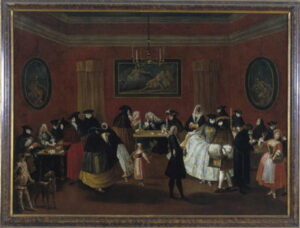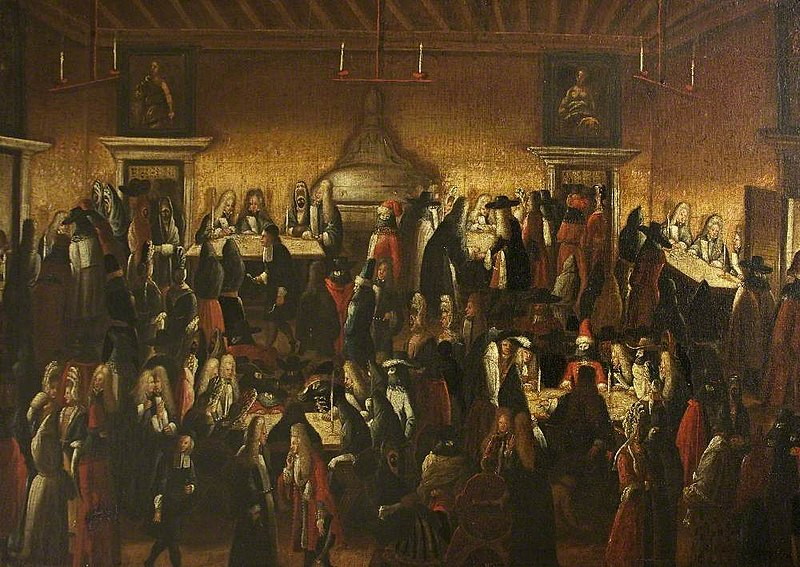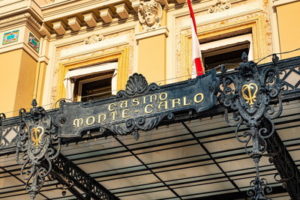
Today, many people have chosen to sign up for an account at an online casino and as a result their insight into the world of land-based casinos may be a little limited. That’s not to say that these physical establishments aren’t popular, though. Many venues continue to draw people in every day for exciting gameplay.
Now that the enforced lockdowns through COVID-19 are over, these casinos are back. People are finally starting to get back into attending them and having a good time. Yet it’s not so very often that we go back in time and think about the original casinos. Only the casinos within the near vicinity are in our minds.
The first modern casinos began operating many centuries ago, believe it or not. While the precise origin of gambling itself isn’t known, there is one venue looked upon as the original casino. Back then, it wasn’t referred to as such, though. Instead, it went by the name of a gambling house.
That venue was the Ridotto, which provided its services from Venice, Italy. It opened its doors in 1638, bringing casino-style gaming to the masses. From the Ridotto, other gambling houses opened within Italy and across Europe. The desire to gamble in such establishments soon spread further afield. It is the legacy of this, the first modern casino, that we intend to look at today.
The History of Ridotto Casino

To understand more about this original casino, we need to go back a little further. In fact, the Ridotto went by the full title of Il Ridotto, meaning “The Private Room” in Italian. It served as a wing of the Palazzo Dandolo in Venice, which was close to the church of San Moisè. The Dandolo today operates as the five-star Hotel Danieli; one of the city’s most lavish. Construction of that palatial building completed at the end of the 14th century. It was then in 1638 that the conversion of Il Ridotto occurred.
This changed the wing into a government-owned gambling house. Venice’s city leaders had requested for this to happen in time for the carnival season. As a result, controlled gambling could take place within Venice. Gambling establishments had existed in China several centuries before the Ridotto. Yet this served as the very first modern casino venue, operating like casinos still do today.
The name “ridotto” actually derives from the Italian word “ridurre”. This means to “close off” or to “make private”. Even so, its original meaning referred to the foyer of a theatre. It also referred to various illegal and private gambling clubs in the Rialto district of Venice. They started coming to prominence after the Venetian authorities tried banning gambling games. It was only when they realised that they couldn’t prevent citizens from gaming that they opened the Ridotto.
Anyone was able to enter the Ridotto when it opened. Yet because the games had high stakes and a formal dress code, only the nobles could afford to play. One of the rules of the casino was that players had to wear three-cornered hats and masks. As a result, less well-off Venetians could not place wagers at the tables.
Speaking of those tables and the games on offer, the Ridotto provided biribi and basetta. The first of those games provided a lottery-like setup. Players placed wagers on one of 70 numbers, and then the banker drew a number from a bag. Anyone with a wager on that number won the pot. Many believe this to be a precursor to the modern game of roulette.
Basetta was a much more popular game for many, though. It operated as a sort of cross between blackjack, poker and gin rummy. Winners were able to secure 60x their stakes from it. Many years later, basetta found itself replaced by the card game known as faro. That gained a greater popularity in the United States once it reached those shores.
The gambling house operated at a successful level for many decades. Yet in 1774, the Venetian reformer Giorgio Pisani proposed its closure. His argument for this was “to preserve the piety, sound discipline and moderate behaviour”. It didn’t take long for the motion to pass, with a huge majority voting in favour of the Ridotto’s closure. The casino shut its doors altogether in the very same year but left a legacy behind for others to build on.
One final piece of information to know relates to the word “casino”. This word is also of Italian origin. It serves as a diminutive form of the word “casa”, which translates to “house”. To put it another way, the word “casino” means “little house”. Therefore, a casino is a little house where people go to gamble.
There’s a bit more to it than that, though. After the closure of the Ridotto, illegal gambling sprung up in Venice once again. Many nobles chose to make use of smaller “clubhouses” on their own properties. There, gambling operations would take place, and it was these smaller venues that took on the name of “casinos”. That’s something that hasn’t changed to this day…well, except for the size. Casinos today are often vast in size, spreading across many square feet.
Other Features of the Ridotto That Are Similar to Today’s Casinos
 While the games available at the Ridotto may not be available today, they have had an influence. Without basseta and biribi, there may be no roulette or baccarat or blackjack. Or we may have ended up with alternate versions of these games to play. There is little doubt about the Ridotto’s influence on modern casinos. Yet it’s not only the available games that have a similarity.
While the games available at the Ridotto may not be available today, they have had an influence. Without basseta and biribi, there may be no roulette or baccarat or blackjack. Or we may have ended up with alternate versions of these games to play. There is little doubt about the Ridotto’s influence on modern casinos. Yet it’s not only the available games that have a similarity.
The Ridotto provided gaming across four floors. Yet this wasn’t the only activity to engage in while at the gambling house. Instead, visitors could wine and dine themselves at restaurants. Coffee, wine and snacks were available to buy, bringing more people in to the venue. It’s not uncommon for casinos today to also have at least one restaurant built into them. In fact, many of them have more than one of these to enjoy.
At the same time, light music is sometimes played through speakers within casinos. Of course, in 17th-century Venice, they didn’t have such technology available. Yet they did have musicians playing traditional instruments for guests. This helped to create a feeling of comfort and serenity inside as gamblers placed their bets.
While Italy managed to hold things down as a central gambling hub, other countries wanted in. After all, making money through regulated casinos was a sure-fire way of boosting the economy. Soon enough, France became the place to be for gamblers. The centre of gravity shifted away from Italy, with France crafting new and unique games. Of course, there is little doubt that those games – roulette and blackjack – got their influence from the Ridotto.
The Influence of the Ridotto Takes Hold
 The fact that France became the central hub of things didn’t mean Venice was altogether abandoned. France has its own long history with gambling anyway. It gave birth to some of the most popular modern-day gambling games, as noted. Special casinos opened up across France by order of the Secretary General, Cardinal Mazarin. Oddly enough, Mazarin was Italian himself. Yet he served as chief minister to Louis XIII and Louis XIV until his death. Mazarin had a gambling habit in his younger days and was often in debt because of it.
The fact that France became the central hub of things didn’t mean Venice was altogether abandoned. France has its own long history with gambling anyway. It gave birth to some of the most popular modern-day gambling games, as noted. Special casinos opened up across France by order of the Secretary General, Cardinal Mazarin. Oddly enough, Mazarin was Italian himself. Yet he served as chief minister to Louis XIII and Louis XIV until his death. Mazarin had a gambling habit in his younger days and was often in debt because of it.
In opening casinos across France, he was hoping to be able to contribute to the state budget. Thanks to the dynamic development of gambling in France, many casinos opened. This led to the creation of the Monte Carlo Casino in nearby Monaco. That became known as the first real casino to operate, rather than a gambling house. Monte Carlo Casino opened so that the property of the principality could multiply. It didn’t take long for Monaco to become the gambling capital of the world due to this. While this venue wasn’t built until 1863, would it have come to light at all without the Ridotto?
Like that establishment, the Monte Carlo has attracted only the wealthiest guests. They travel from all over Europe to play games in the venue. People know it to host celebrities from the world of theatre and music, as well as sport. That has been the case throughout the Monte Carlo’s history. Of course, the Ridotto had games that only the nobility and wealthy could play. There is little doubt that there is a connection there.
While the Ridotto closed its doors in 1774, it didn’t spell the end of casinos for Venice. Also opened in 1638, the Casino di Venezia currently stands as the oldest active casino in the world. Situated on the Grand Canal, it features renaissance-style architecture for guests to enjoy. Not only that, but the establishment is best approached by gondola or water taxi.
The Casino di Venezia operated as a theatre in its original form. Within that theatre stood a specific wing for gambling. Anyone attending the theatre would visit this area during intermissions. The Ridotto was the first modern day casino, but the Venezia helped spark the casino craze. By 1744, over 120 of these venues were active in Venice. Upon its initial launch, the establishment had the name Ca’ Vendramin Calergi. It was then taken over by Italian royalty. Decades later, it fell into the hands of German composer Richard Wagner. He used it as a getaway on frequent occasion between 1858 and his death in 1883. The city of Venice then bought it back in 1946 and renovated everything inside. In 1959, it re-opened as an official casino in the city.
It remains active as such today, offering various casino games to play. Blackjack, roulette, poker and more are available inside, hosted by dealers in tuxedos. At the same time, slot machines take pride of place on the floor. The World Poker Tour has even held tournaments at the venue over the years. As is common for casinos, it also hosts its own restaurant – the Wagner.
The Ridotto kick-started the influence of casinos in Venice, without a doubt. If it hadn’t been set up, there is a chance that the Casino di Venezia wouldn’t be around today. You could say the same thing about various other casinos around the world.
